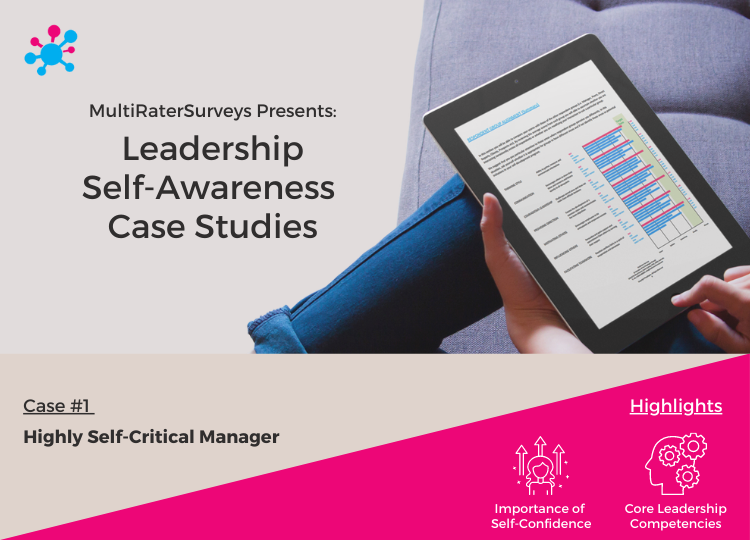“The report has nailed it. We need to make [Jane] aware that she's doing a much better job in every leadership area than she gives herself credit for.”
CEO of the organization
Snapshot:
A 200-employee company recently conducted an organization-wide 360-degree review for their middle & senior managers using the MultiRater Surveys platform. In addition to the 360 Degree Leadership Feedback Survey Report they were able to access our newly developed Leadership Self-Awareness Report. With the insights from this new report, they were able to identify a highly capable and respected member of their leadership team that exhibited extremely low awareness in their leadership abilities – very low self-confidence. For the sake of anonymity, the manager in question will be referred to as Jane Smith.
Now you might be asking: “Well if Jane is already highly respected, and is performing to an excellent standard within the organization, does it matter if she is unaware of her great leadership?” Let’s see.
What does the Leadership Self-Awareness Report say?
Most business leaders understand the importance of executives and managers being aware of their people management and leadership capabilities, especially how everyone else around them perceives their behaviours and actions.
The report shows that Jane is highly unaware of her leadership abilities. In all competencies Jane is extremely self-critical in her capabilities as a leader. She has labelled herself as “Lacking Competence” in most areas but those around her regard her as being highly competent. By underestimating her leadership capabilities, she is selling herself short and restricting her ability to lead.
The consequences of a leader with low-self-confidence can bring about the following:
1. Spend personal and work time “thinking” about how they could be better – rather than to utilise their already-great capabilities
2. Increased reservations – not leading with “their chest”
3. Not fully utilising their leadership toolkit – especially if their toolkit is extremely refined & is well received by direct reports and peers
4. Not “backing” themselves and therefore miss opportunities for personal and organizational growth
It is important to note that while a leader with low self-awareness is not ideal, studies show that being self-critical is still significantly less detrimental than being self-positive. While it is still ideal to be highly self-aware, managers with low confidence (self-critical) act with more caution and treat leadership responsibilities more carefully. However, if there is no inherent need to lead carefully (e.g., Jane is already an extremely well-rounded leader), then there is no need to hesitate and instil self-doubt. To lead with more confidence, and awareness that she is great, will bring about a more proactive leader, taking her team and the organization to the next level.
Quantitative versus Qualitative Impressions
Jane’s reporting manager was asked for a qualitative perspective on a few of her leadership competencies (randomly selected) – whether she tends to be self-critical, or overconfident in her abilities (see Table 1). It appears that the Leadership Self-Awareness Report had captured a great deal of Jane’s self-awareness as a manager, and more importantly, her tendency to be self-critical. Note that judgements were made before the Self-Awareness Report was generated.
| Competencies | Rating |
| Building Relationships | Self-Critical |
| Organizational Values | Self-Critical |
| Personal Development | Self-Critical |
| Communication | Self-Critical |
| Delegating Responsibility | Self-Critical |
In addition, this is what her CEO had to say:
“Jane is a reasonably confident leader, and is seen as such by her direct reports, but she thinks she's not doing as good a job in her role as others think she's doing....therefore, falls into [the] self critical category.”
Result
Equipped with tangible and objective information, Jane, along with her team and manager, can now work together to help increase her self-awareness as a leader. To believe in her own capabilities and to lead more confidently. In doing so, for Jane’s 360 degree review next year, we expect to see a shift in the competencies on the Self-Awareness Report.
Take Home
1. Effective & optimal leadership begins with Self-Awareness
2. A manager who is a high performer but is extremely self-critical is only one step away from becoming THE top-performer
3. MultiRater Surveys Leadership Self-Awareness report is highly correlated with qualitative impressions
To learn more about MultiRater Survey’s Leadership Self-Awareness Report – download our free E-Book. Or contact info@multiratersurveys.com for more information on how you can increase the self-awareness of the leaders in your organization.
Be sure to check in next month for our next profile in our series of Leadership Self-Awareness case studies.
